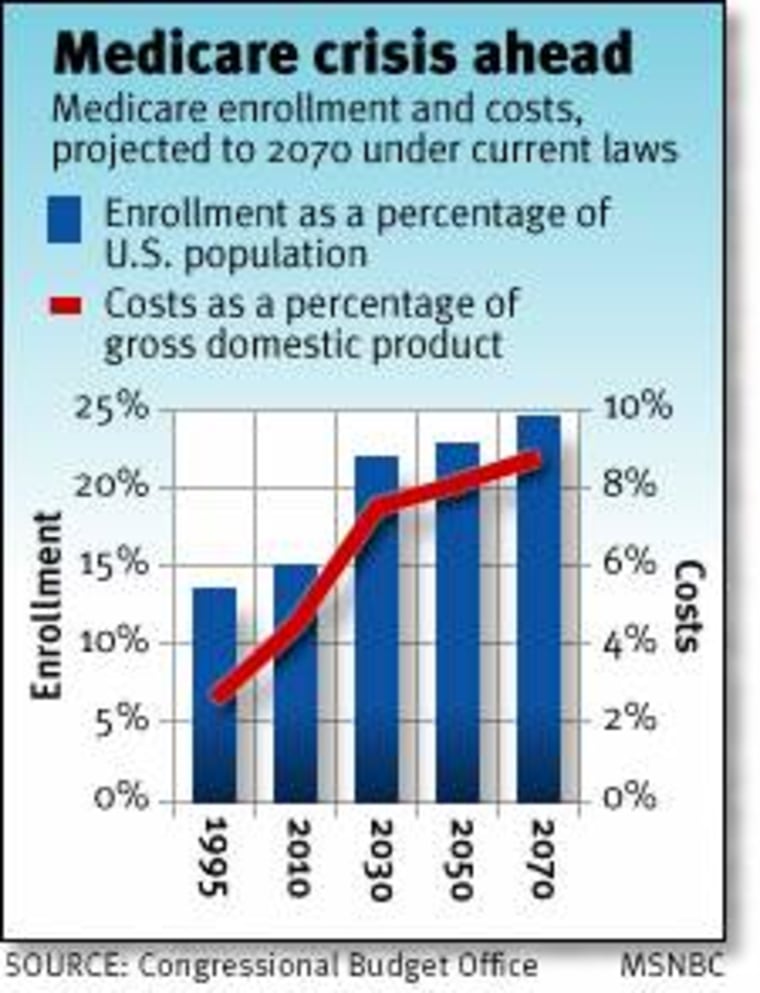Republicans won the blessing of the politically influential AARP Monday for their emerging Medicare prescription drug bill, but Sen. Ted Kennedy countered with a scathing attack on the measure, saying it included a “$12 billion slush fund to lure seniors” into private coverage. At the White House, President Bush arranged to meet with lawmakers who have spent months negotiating the deal and now must find votes to pass it.
WILLIAM NOVELLI, CEO of the AARP, said his group would “pull out all the stops” to pass the legislation, including a three-day television advertising campaign this week.
The bill is not perfect, he conceded, “but the country can’t afford to wait for perfect. On balance, it’s the right thing for seniors in America and their families.”
Kennedy, D-Mass. and his party’s leading spokesman on health matters, said the program would offer private insurance more money to insure the elderly than traditional Medicare spends. At the same time, he said a $12 billion fund to offer additional incentives amounted to a “slush fund.”
Kennedy and Rep. Charles Rangel, D-N.Y. — both of them Medicare-eligible — also attacked a proposal for direct competition between traditional Medicare and the new private plans, a program they said would increase premiums for seniors opting against managed care.
“This debate is no longer about providing a prescription drug benefit for seniors. Instead, it has become a fight to preserve Medicare for current and future beneficiaries,” said Rangel, the senior Democrat on the House Ways and Means Committee.
PASSAGE THIS WEEK?
Supporters of competition argue it will control the cost of Medicare over the long run.
The day’s events signaled the onset of a politically charged clash over the legislation, which Republican congressional leaders hope to push through the House and Senate in the next several days.
The bill would create a prescription drug benefit for 40 million elderly and disabled Medicare beneficiaries beginning in 2006. Participants would be offered a chance to purchase coverage at a monthly premium of $35, with a $275 deductible, a gap in coverage and protection against extremely high annual expenses.

At the same time, the bill would establish a new role for private health plans in Medicare, encouraging them to offer seniors the choice of receiving coverage under managed care plans such as preferred provider organizations. That system encourages use of certain doctors but allows patients to go elsewhere if they pay extra.
Republicans yearned for AARP’s endorsement of the bill as an effective foil against Democratic attacks that the GOP is out to destroy the government-run health insurance program for 40 million older and disabled Americans.
The American Medical Association and American Hospital Association approved it as well, while the AFL-CIO opposed it. The Consumers Union issued a study saying that the drug benefit would range from modest to skimpy, depending an individual Medicare beneficiary’s income.
WAITING FOR BUDGET NUMBERS
Republican congressional leaders sealed a tentative agreement Saturday with two Democrats, Sens. John Breaux of Louisiana and Max Baucus of Montana.
Their next step is to await word from budget experts to make sure the measure doesn’t exceed the $400 billion, 10-year price limit that Bush imposed earlier this year in requesting legislation.
After that, the leaders can see whether the political and policy calculations they made hold up.
In five months of bargaining, the GOP leaders struggled to write a bill that could appeal to enough conservatives to clear the House, while gaining enough support from moderate Democratic senators to avoid a filibuster.
Other than Breaux and Baucus, no congressional Democrat voiced support for the legislation over the weekend, although others are expected. “Many will reach the decision that this is better to pass than not to pass,” Baucus predicted.
Neither Kennedy nor Senate Democratic leader Tom Daschle has yet threatened a filibuster - a tactic that requires bill supporters to gain 60 votes to prevail. But neither found much to like in the proposed legislation, to judge by their rhetoric.
“It keeps drug prices high, causes two to three million retirees to lose drug coverage and coerces seniors into HMOs,” Daschle, D-S.D., said in a statement.
House Democratic leader Nancy Pelosi of California said the losers in the deal were older Americans, while the winners were “the Republicans’ special-interest cronies. Republicans leaders are giving millions of dollars in windfall profits to the pharmaceutical industry ... and giving billions of dollars as a slush fund for HMOs.”
The legislation creates a $12 billion fund to help managed-care plans take hold among the Medicare population. In addition, it leaves in effect the current ban on importation of lower-cost prescription drugs from Canada.
Among Republicans, GOP leaders hope that some provisions in the bill will attract conservative support - the very elements that Kennedy and other critics oppose most strongly.
The measure includes a new health-related tax break for individuals who purchase health insurance with a high deductible.
It also requires the president to propose legislation in the future if Medicare spending exceeds a fixed percentage of government revenues. Congress would have to consider the proposal but not be required to vote on it.
Additionally, the bill provides for a temporary program of competition to pit traditional Medicare against the new private plans in a handful of metropolitan areas beginning in 2010. Conservatives say that will help hold down the growth in the program’s cost.
But critics argue that will wind up leaving sicker and older beneficiaries in traditional Medicare and facing higher premiums.
Apart from Democrats, Republican Sen. Olympia Snowe of Maine said she is “deeply concerned” about the impact of direct competition on seniors.
© 2003 Associated Press. All rights reserved. This material may not be published, broadcast, rewritten or redistributed.
